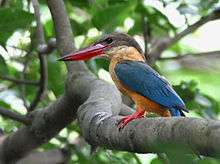Stork-billed kingfisher
| Stork-billed kingfisher | |
|---|---|
 | |
| From Baranagar, India. The shape of the bill is so unique and looks much like a bill of Stork, which suggests the common name of the species. | |
| Scientific classification | |
| Kingdom: | Animalia |
| Phylum: | Chordata |
| Class: | Aves |
| Order: | Coraciiformes |
| Family: | Halcyonidae |
| Genus: | Pelargopsis |
| Species: | P. capensis |
| Binomial name | |
| Pelargopsis capensis (Linnaeus, 1766) | |
| Synonyms | |
|
Halcyon capensis | |
The stork-billed kingfisher (Pelargopsis capensis) (formerly Halcyon capensis), is a tree kingfisher which is widely but sparsely distributed in the tropical Indian subcontinent and Southeast Asia, from India to Indonesia. This kingfisher is essentially resident throughout its range.

This is a very large kingfisher, measuring 35 to 38 cm (14 to 15 in) in length.[2] The adult has a green back, blue wings and tail, and grey head. Its underparts and neck are buff. The very large bill and legs are bright red. The flight of the stork-billed kingfisher is laboured and flapping, but direct. Sexes are similar. There are 15 races, mostly differing in plumage detail, but P. c. gigantea of the Sulu Islands has a white head, neck and underparts. The call of this noisy kingfisher is a low and far reaching peer-por-por repeated every 5 seconds or so as well cackling ke-ke-ke-ke-ke-ke.
Stork-billed kingfisher is a species of a variety of well-wooded habitats near lakes, rivers or coasts. It perches quietly whilst seeking food, and is often inconspicuous despite its size. It is territorial and will chase away eagles and other large predators. This species hunts fish, frogs, crabs, rodents and young birds.
Stork-billed kingfisher digs its nest in a river bank, decaying tree, or a tree termite nest. A clutch of two to five round white eggs is typical.
References
- C H Fry & Kathie Fry; illustrated by Alan Harris (2000). Kingfishers, Bee-eaters and Rollers. Princeton University Press. ISBN 0-691-04879-7.
- ↑ BirdLife International (2012). "Pelargopsis capensis". IUCN Red List of Threatened Species. Version 2013.2. International Union for Conservation of Nature. Retrieved 26 November 2013.
- ↑ Ali, Sálim (1996). The Book of Indian Birds (12th ed.). Bombay: Bombay Natural History Society. ISBN 0-19-563731-3.
Gallery
-

Chinese Garden - Singapore
-
_eyeing_a_prey_in_Kolkata_W_IMG_3555.jpg)
eyeing a prey in Kolkata, West Bengal, India.
-
_sitting_above_a_water-hole_in_Kolkata_I_IMG_0380.jpg)
Sitting above a water-hole in Kolkata, West Bengal, India.
-
_calling_at_Kolkata_I_IMG_7503.jpg)
Calling in Kolkata, West Bengal, India.
-

In Kolkata, West Bengal, India.
-

In Kolkata, West Bengal, India.
-

In Kolkata, West Bengal, India.
-

In Kolkata, West Bengal, India.
-
-
Stork-billed Kingfisher

